
MANILA, Philippines — Finance Secretary Ralph Recto said he wants to raise P100 billion from the pipeline of government assets that are up for sale to help bridge the Marcos administration’s budget deficit and cut debt.
“We want to hit a hundred billion,” Recto told reporters on the sidelines of the induction ceremony for new officers of the Economic Journalists Association of the Philippines. “The idea is to plug the deficit. And to bring our debt-to-GDP (gross domestic product) ratio down, too. Possibly a hundred billion,” he said, adding that the Department of Finance (DOF) is still finalizing its target revenue from asset sale for this year.
Figures showed the Privatization and Management Office (PMO) of the DOF remitted P1.88 billion to the Bureau of the Treasury last year from the sale of nonperforming state assets along with cash dividends and other forms of revenue. The amount surpassed the PMO’s remittance target for last year by 187.9 percent.
READ: Privatization office beats 2023 remittance target by 84.6%
PMO had said it would prioritize disposing assets that are too costly to maintain this year, as well as those without informal settlers and pending legal cases.
Potential buyers
Meanwhile, Recto said he would order the PMO to publish a list of properties that are on the auction block to attract more interest from potential buyers. Already, the finance chief said the Government Service Insurance System was interested in buying an asset located on Roxas Boulevard in the city of Manila.
READ:Aggressive asset sales to help fund budget
“So at least that’s good and I can give a discount because it’s a pension fund. Government to government,” he said.
The decision to pursue aggressive privatization targets came as Recto tries to avoid imposing new taxes to plug the Marcos administration’s budget hole, which is projected to hit P1.4 trillion this year. Instead, the finance chief is banking on collection efficiency and reduction in unnecessary spending to improve the state’s fiscal health.
The government may also study possible increases in fees and charges, and boost nontax revenues like dividends from state-run firms and proceeds from sale of government assets, Recto said.

